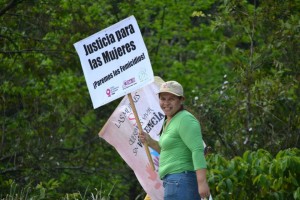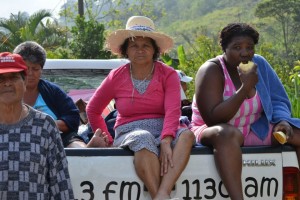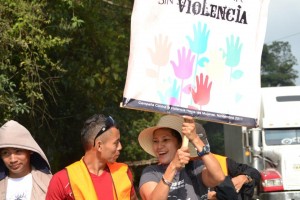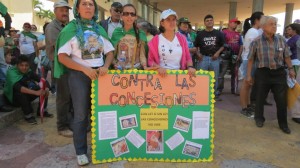 They set out on February 25, from different parts of a country torn apart. In silent defiance, they entered the capital city of Tegucigalpa on March 6. On International Women’s Day they made their demands of a government that has trampled their rights and brought bloodshed across the nation since the rule of law was shattered three and half years ago.
They set out on February 25, from different parts of a country torn apart. In silent defiance, they entered the capital city of Tegucigalpa on March 6. On International Women’s Day they made their demands of a government that has trampled their rights and brought bloodshed across the nation since the rule of law was shattered three and half years ago.
Honduras’ “Walk for Dignity and Sovereignty Step by Step” brought together peasant and indigenous organizations including COPINH and OFRANEH, Via Campesina, some Jesuits and other church people, human rights defenders, workers and professionals. And– as at every step of the way in the Honduran movement for peace and democracy—feminists. Honduran feminists of all ages, organized and independent, participated not only to support the general demands, but to insist that the foundations of a new society must include an end to violence against women and full recognition of women’s rights and aspirations.
Gilda Rivera, director of the Center for Women’s Rights in Tegucigalpa, walked most of the 200-kilometer route. She summed up the mobilization, “This is powerful first step especially to link up the social and popular movements. When we joined together in organizing this walk, we strengthened the unity of the Honduran people. And for feminists, by being an integral part of the walk, we won recognition and respect for the national feminist movement and acknowledgement that we’re part of the popular movement.”
Walking to save a nation
Honduran women continue to risk their lives to defend their rights and demonstrate against the violence and human rights violations that have come to characterize their country since the June 28, 2009 coup d’état. Their involvement in the on-going opposition to the coup and the subsequent government of President Porfirio Lobo has been critical to the democracy movement. Besides adding the force and commitment of women from all over the country, Honduras is now one of the few countries where women’s demands explicitly form part of a broad movement for social justice.
The Walk was a response to widespread crisis in the country. Its demands express popular concerns over environmental degradation, repression, growing violence and a breakdown in the justice system. Hundreds of participants and supporters demanded revocation of several recent laws that would radically alter land use in the country, transferring resources from indigenous and farming communities, to national and foreign investors: the Mining Law, the constitutional reform called “Special Development R egions” or Model Cities, and the law for Agricultural Modernization. The declaration of the march declared that these laws “ignore public opposition, violate national sovereignty and cause environmental destruction, persecution and death…” by causing displacement and generating conflict. Echoing conflicts throughout Latin America, the declaration demanded that mining concessions be rescinded, as well as concessions for outsiders’ use of water.
egions” or Model Cities, and the law for Agricultural Modernization. The declaration of the march declared that these laws “ignore public opposition, violate national sovereignty and cause environmental destruction, persecution and death…” by causing displacement and generating conflict. Echoing conflicts throughout Latin America, the declaration demanded that mining concessions be rescinded, as well as concessions for outsiders’ use of water.
The protest also opposed “displacement, militarization, repression and the violation of the right to self-determination, national sovereignty and life,” and demanded the immediate release of José Isabel Morales Lopez, a member of the farmers’ Movement of Aguan (MCA), a halt to criminalization of the agrarian struggle and social movements, and intensive militarization, and investigation into the assassination of at least 92 members of those movements. They called for compliance with ILO Convention 169 and the UN Declaration of the Rights of Indigenous Peoples, which recognize the right of indigenous peoples to participate in decision-making regarding their territories and the resources there.
Raising women’s issues for social justice
Scores of women’s organizations marched under the slogan “Step by Step for National Sovereignty and Autonomy for Women”. The influence of feminists in the broader Honduran movement for democracy and social justice is reflected in the final point of the declaration: “Women and feminists in this country are sick of the violence against women and the increase in femicides. We say no more legal indifference, institutionalized misogyny and impunity, and respect for the human, economic, social cultural and sexual rights of everyone.”
Honduran feminists also issued their own “Feminist Declaration to Honduran Society” during the walk and coinciding with International Women’s Day, declaring:
1. That women from all over the country, historically have suffered inequality, poverty, marginality and exclusion from patriarchy that has worsened each day with the deepening of the neoliberal capitalist crisis We declare that in this country our government has responded with violence, repression, corruption and the militarization of minds and the society’s public places.
2. That all Honduran women, without exception, share the consequences derived from the general violence that harms us and that places our country in an undeclared war, where women are cannon fodder, objects of exchange, of use and abuse, of buying and selling, and the perfect target for rivalries between criminal men. We are, in the end and within this logic, the weakest link although they attempt to neutralize this fact with legal reforms that are only Band-Aids to our real problems.
3. That we are aware that in this undeclared war, where the excuse is the war on drugs, they are militarizing our country with their own army and with foreign armies, to expropriate our natural resources, our territories, just as they have historically expropriated our bodies and our lives.
4. That this war is a planned war, implanted as a new, renovated and more subtle—or at times more blatant—form of colonialism, in which a handful of Honduran families receive compensation and the blessings of national and transnational powers.
5. That corruption in this country is not only within the police; it is also within the armed forces, members of the justice system, public institutions, political institutions, the mass media and the pulpits. These cosmetic measures that never work are a smokescreen and actually serve to divide us and move us toward chaos so that the country be seen as a failed state.
6. That we did not raise assassins. The assassins are the product of the same system and of a voracious and devastating culture that is on a track to destroy our life, the life of our earth and its resources.
7. That the politicians of our country, and legal and quasi-legal forces, fill us with shame and indignation, and the security policies established by our rulers do not help us. They do not work for women, or for the population that stands up for its dreams and is working for another kind of Honduras.
8. That we will continue to defend a secular Honduran state, because the strengthening of fundamentalist groups in government threatens the advance of our sexual and reproductive rights and citizen rights, and erodes the social and cultural advances that the feminist movement has promoted. That we will continue to challenge fundamentalisms that seek to dominate our lives, because we’ll never give up on our effort to build freedom, dignity, a good life, happiness, sisterhood and justice.
9. That we oppose the approval of the Law of Special Development Regions and the Mining Law because they will produce an aggressive process of land grabs of natural resources that is leading to displacement of large sectors of the population, and greater presence of U.S. military bases that seriously harm our national sovereignty.
10. That we are monitoring the acts of the State, its institutions and its representatives, especially the National Institute of Women and we denounce the corruption and growing use of women as instruments of political campaigns.
On the road
Women from the wom en’s and feminist organizations that participated in the march generally agreed the experience gave them visibility and let the rest of the country know that many citizens were willing to publicly oppose the policies of the Lobo government, despite the personal risks.
en’s and feminist organizations that participated in the march generally agreed the experience gave them visibility and let the rest of the country know that many citizens were willing to publicly oppose the policies of the Lobo government, despite the personal risks.
Daysi Flores of Feminists in Resistance and Just Associates wrote in a blog as the march began, “This reality is too overwhelming to sit back or to resist with just one body–this reality can only be confronted collectively. So the Honduran people have begun a journey for national sovereignty… and just as rivers flow together to gather force before reaching the sea, walks from other communities will join in and come together in Siguatepeque, Comayagua. The word “Siguatepeque” comes from the Nahuatl word “Cihuatepetl” – “Land of Women” and it is here that feminists from the north, the south, center, east and west will meet to become part of the Step by Step walk and march to Tegucigalpa, demanding Sovereignty for our Peoples, Women with Autonomy.”
The Step by Step protest passed through places that symbolize Honduras’ post-coup collapse: the penitentiary in Comayagua, where 361 people died on Valentine’s Day 2012 in a prison fire, many with signs of execution. The U.S. military base in Soto Cano, also known as Palmerola, where the coup regime and Lobo regimes have allowed a U.S. military build-up comparable to the eighties when the country was used as a staging ground for wars to prop up rightwing dictatorships in the region. It skirted poor barrios and crime-infested neighborhoods, contaminated rivers and deforested hills.
Despite the national mobilization, the Honduran government did not enter into dialogue with protesters, much less respond to demands. Rivera states that she expected that response because of the tight web of powerful economic and political interests behind the new land-use laws.
“They’re not going to go back on the Mining Law, they’re not going back on the Model Cities Law,” she said, noting that Juan Orlando Hernández, the current president of the Congress is a staunch promoter of the new laws.
Jessica Sánchez, Honduran feminist and columnist for the Americas Program who also participated, stated, “I think the role of women has been fundamental. We were half the people in the march. At the stops along the way, men swept and cooked; we saw a change in roles, a cultural change.” She noted the participation of new kinds of women’s groups, such as the Women Affected by Mines from the Siria Valley, who don’t necessarily define themselves as feminists but have organized women’s groups in defense of the environment and their communities.
“This issue of selling off national territory in the Special Development Regions would cut the country in pieces. It’s not an academic issue. It’s a profound pain that feels like a thorn in your body,” Sanchez affirmed.
‘We’re still here’
One of the huge barriers for the organizers is the control of the press in Honduras. The press largely ignored the march until the end, with little echo in the international press either. The number of journalists murdered and threatened in the country forewarns Honduran journalists that reporting on opposition events can be a dangerous occupation.
Protestors worry that the international community has forgotten about Honduras, just when the situation in the country has deteriorated to the point of making it one of the most violent nations in the world, a human rights disaster and a global pilot project for transnational control of national resources.
 “After the ‘boom’ of the coup, international interest fell off. It’s important that the international community not abandon Honduras because along with Haiti, we’re the country most threatened by the advance of neoliberalism and the right, violence and looting,” says Sánchez. “It’s hard for us to speak out because of the risk, that’s why it’s so important not to leave Honduras out of the public eye on the international level.”
“After the ‘boom’ of the coup, international interest fell off. It’s important that the international community not abandon Honduras because along with Haiti, we’re the country most threatened by the advance of neoliberalism and the right, violence and looting,” says Sánchez. “It’s hard for us to speak out because of the risk, that’s why it’s so important not to leave Honduras out of the public eye on the international level.”
Women who participated in the march and the protests in the capital still hope that their actions will make a difference. Their declaration concludes, “[We feminists] will continue walking in the feminist spirit, which is none other than assuming the responsibility as human beings to keep up hope and joy when facing a culture of death and pain. Our feminist spirit flourishes in the struggle of the Honduran people. We are here and here we will stay.”
Laura Carlsen is director of the CIP Americas Program in Mexico City www.americas.org
Photos by Luis Mendez



